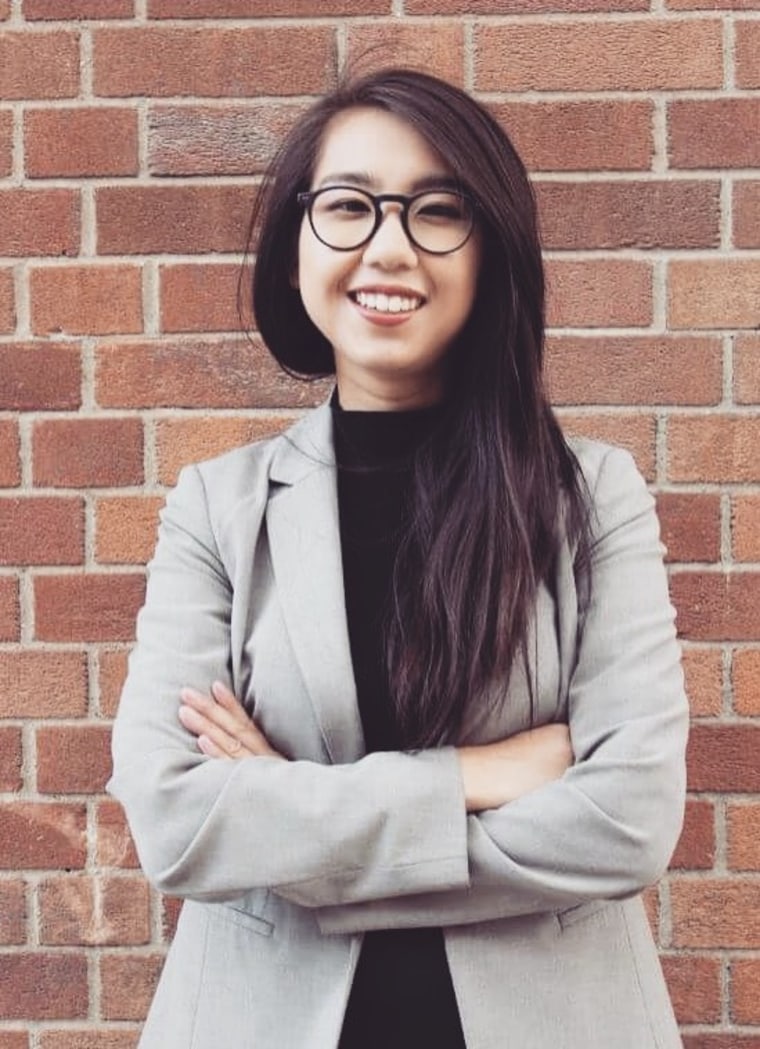Jennifer Chan, a lawyer in Toronto, Canada, says she paid off $50,000 in student loans in two-and-a-half years.
After she graduated from law school in 2015, Chan realized she needed to develop a more minimalist lifestyle to pay off her loans.
“Minimalism was realizing that I didn’t really need to live with that much,” Chan told NBC News BETTER.
Here’s how Chan, 27, author of the minimalist newsletter “Deliberate Discourse,” says she tackled her student loans.
She sold most of her stuff and kept her expenses low

Chan sold her car and almost everything she owned.
She only got about $1,000 for the car, she says, but she saved big in the long term because she was no longer paying for parking and gas.
“I just didn’t need it, and it was part of my letting go of everything,” says Chan, who now uses public transit to get to work.
Chan says she kept her expenses at or below 50 to 60 percent of her net income. She lived in a simple one bedroom apartment with her fiancé, who split the rent with her 50/50. She cooked most of her meals, she says, and allowed herself around $200 for groceries and $150 for eating out each month.
She maintained a simple budget
Chan says a simple budgeting system was a big part of paying off her loans quickly.
Instead of giving herself a laundry list of spending categories, she has only six: Rent, Spending Money, Pet expenses, Transit, Cell Phone, Utilities and Subscriptions.
She says her “Spending Money” category is the largest and accounts for most of her spending, which helps keep things simple.
“That gives me the freedom to decide how I want to spend this lump sum for the entire month,” she explains.
She automates her savings
Chan set up automatic deposits from her paycheck into three separate accounts: short-term savings, emergency savings, and a retirement account.
“So I don’t really need to think about it that much,” she says.
She tracks her spending
Chan says the single most important action she took to pay off her student loans quickly was tracking her spending.
Instead of relying on an app, she spends five minutes every evening reviewing her online bank account, and writes down everything she bought that day in a journal.
She says tracking her spending by hand forces her to be conscious of her spending.
“When you track your spending, you have absolutely no choice but to confront all the poor ways that you are spending your money on something,” she says.
She has monthly coffee “dates” with herself
At the end of each month, Chan sits down with a cup of coffee and reviews her budget — this helps her stay on top of any adjustments she will need to make for the upcoming month, so there aren’t any unexpected expenses.
“It really changes based on if I’m going away, if we need a dog walker, if I am going to be using a car share,” she says.
When you track your spending, you have absolutely no choice but to confront all the poor ways that you are spending your money on something.
She contributed as much money as she could to paying off her debt
During the two-and-a-half years it took Chan to pay off her loans, she switched to a lower paying job. She says her income took a big dip, but she continued to stay focused on contributing as much as she could to paying off her loans. Her payments ranged between 25 to 40 percent of her income, she says, depending on how much she was making at the time.
She looks at minimalism as a lifestyle, rather than a sacrifice
Chan says she became debt free in July 2018.
“It was the best feeling of my life,” says Chan.
Being good with your money is a lifelong thing.
Chan is now using her budgeting system to save for her wedding next year. She says it’s important to see minimalism as a lifestyle rather than a sacrifice.
“Being good with your money is a lifelong thing,” says Chan, “but even if I won the lottery tomorrow, if I wasn’t good with my money that would be gone in about a year.”
How to use minimalism to pay off debt:
- Get rid of anything you don’t need: Go through your stuff, figure out what you can get rid of, what’s costing you money, and what you can sell.
- Keep your expenses as low as possible: Cook your meals at home and give yourself a small allowance for entertainment and eating out.
- Maintain a simple budget: Six categories with one broad category for spending will keep things simple.
- Automate your savings: Set up direct deposits from your paycheck to your bank accounts, so everything is done for you.
- Track your spending: Each night, write down everything you spent your money on. This will force you to be conscious of how you are spending your money.
- Review your budget each month: At the end of each month, take time to prepare for how your budget might change the following month, so nothing is unexpected.
- Contribute as much as you can to paying off your debt: A good rule is to contribute 25-40 percent of your income to your loans, depending on your expenses and how much you make.
- Look at like a lifestyle: It’s not just about paying off debt — it’s about the way you live your life.
MORE WAYS TO GET OUT OF DEBT
- How to pay off your loans using the 'debt avalanche' method
- How to get out of debt and build a 'wealth snowball'
- How this couple paid off $65,000 in credit card debt and student loans in five years
- How the 50-20-30 rule can help you get out of debt and save money
Want more tips like these? NBC News BETTER is obsessed with finding easier, healthier and smarter ways to live. Sign up for our newsletter and follow us on Facebook, Twitter and Instagram.
